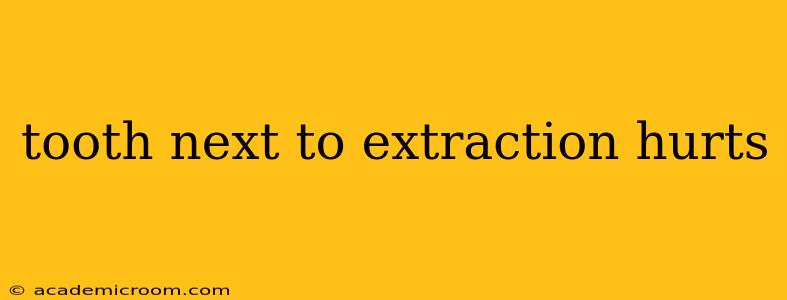Having a tooth extracted can be a significant experience, and while the anticipated pain at the extraction site is expected, many patients experience discomfort in the adjacent tooth. This pain can range from mild aching to sharp, throbbing sensations and is often a source of concern. This comprehensive guide explores the reasons why the tooth next to an extraction might hurt, what you can do to alleviate the pain, and when you should seek professional dental care.
Why Does the Tooth Next to My Extraction Hurt?
The pain in the tooth next to your extraction is usually related to the trauma of the extraction process itself, the healing process, or a pre-existing dental issue. Several factors contribute to this post-extraction discomfort:
-
Inflammation and Swelling: The extraction site experiences significant inflammation and swelling, which can put pressure on the neighboring teeth and nerves, causing pain. This is a normal part of the healing process.
-
Referred Pain: Pain is sometimes felt in a different location than the source. The nerves in your jaw are interconnected, so pain from the extraction site can be felt in the adjacent tooth.
-
Dry Socket: A dry socket occurs when the blood clot protecting the extraction site dislodges, exposing the bone and nerves. This can cause severe, throbbing pain that often radiates to neighboring teeth.
-
Infection: In some cases, an infection can develop at the extraction site, leading to pain, swelling, and fever. The infection can also put pressure on nearby teeth.
-
Pre-existing Problems: A pre-existing issue with the adjacent tooth, such as a cavity, gum disease, or cracked tooth, might become more noticeable or painful following the extraction due to increased sensitivity or inflammation.
-
Sinus Issues (Upper Molars): Extractions of upper molars are close to the sinuses. The extraction process can sometimes cause sinus issues, resulting in pain that is perceived in the adjacent teeth.
How Long Does the Pain Last?
The duration of the pain varies depending on the individual, the complexity of the extraction, and the presence of any complications. Generally, the most intense pain subsides within the first few days, but some lingering discomfort might persist for a week or two. If the pain intensifies or lasts longer than two weeks, consult your dentist.
What Can I Do to Relieve the Pain?
Several home remedies can help manage the pain in the tooth next to your extraction:
-
Over-the-counter pain relievers: Ibuprofen (Advil, Motrin) or acetaminophen (Tylenol) can effectively reduce pain and inflammation. Always follow the dosage instructions.
-
Ice packs: Applying ice packs to the extraction site can help reduce swelling and numb the area. Apply ice for 15-20 minutes at a time, several times a day.
-
Saltwater rinses: Gently rinsing your mouth with warm saltwater several times a day can help keep the area clean and reduce inflammation.
-
Soft foods: Stick to soft foods that don't require extensive chewing to avoid irritating the extraction site.
-
Avoid smoking and alcohol: Smoking and alcohol can interfere with the healing process and increase the risk of infection.
When Should I See a Dentist?
While some discomfort is expected, you should contact your dentist immediately if you experience:
- Severe pain that doesn't respond to over-the-counter pain relievers
- Increased swelling or redness
- Fever or chills
- Pus or foul-smelling drainage from the extraction site
- Difficulty opening your mouth
- Numbness or tingling that persists
Is the Pain in the Adjacent Tooth Normal?
Mild to moderate pain in the tooth next to the extraction is often normal, especially in the first few days. However, it's crucial to monitor the pain and seek professional help if it intensifies or doesn't improve after a week or two. Your dentist can assess the situation, rule out any complications, and provide appropriate treatment.
Can a Pre-existing Condition in the Adjacent Tooth Cause More Pain After Extraction?
Yes, a pre-existing condition, such as a cavity or cracked tooth, can become more sensitive or painful after an extraction due to increased stress on the tooth and surrounding tissues. Your dentist will address any pre-existing issues during your post-operative checkups.
This information is intended for general knowledge and informational purposes only, and does not constitute medical advice. It is essential to consult with a qualified dental professional for any concerns or questions regarding your specific situation. They can provide personalized guidance and ensure proper healing.
